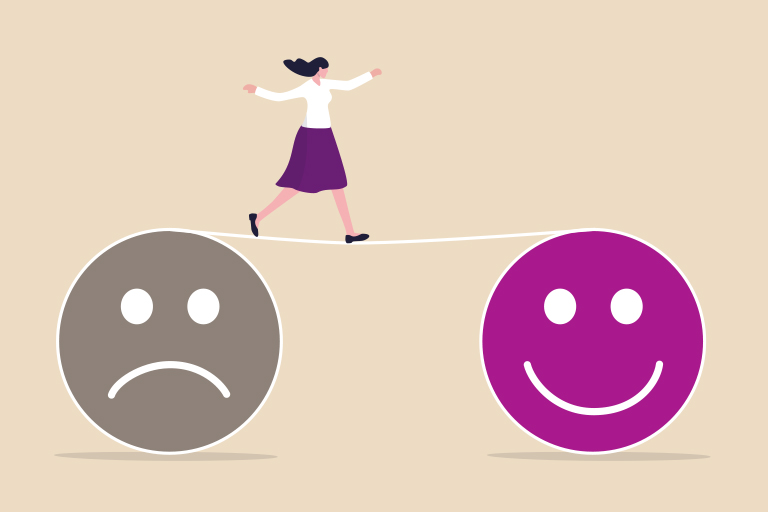Nicole’s Story – Learning Dual Diagnosis the Hard Way

Hard Time to Better Times
Sometimes, being in jail allows you the time to evaluate your life. That’s exactly what happened to Nicole. Facing 36 days in jail for 11 misdemeanors, she realized that being homeless, addicted, and incarcerated was not the life she wanted to live.
Her path to this realization started when she was young. Her father was addicted to crack. Her mother and stepdad weren’t strangers to drug use. Since just about everyone in her family had some type of addiction, they seemed to accept the fact she too would at some time want to experience drugs. Her first experience began at age 16 when a friend introduced her to marijuana. At 18, she graduated to pain pills which she used on and off for the next 10 years.
Taking a Leap
It was during this time that Nicole got involved with an abusive man who blamed his behavior on his use of meth. Things got so bad that she was compelled to jump out of a moving car to escape the beating he was giving her. From there, her life continued to go downhill.
Her leap from the car tore her ACL, and she returned home to live with her mother to recover. But when it was time to leave there, her car was her only home. Because she was homeless, she was unable to have or see her daughter. That’s when she turned to meth, using it to mask the pain she felt without her daughter in her life.
Things went from bad to worse once someone wrecked her car. She continued to date men with addiction problems. A bar owner gave her and her boyfriend at the time a chance to live and work if they would get clean. They weren’t able to adhere to the rules and eventually got kicked out. With 19 warrants facing her in one year, jail became her home.
Addressing Two Issues
It was there that she worked with a counselor from The Counseling Center who recognized that in addition to her addiction, Nicole was facing certain mental health issues. ADHD, anxiety, and depression were all contributing to the challenges she was facing, but now, with an understanding of this dual diagnosis, she would be able to have access to the tools she needed to deal with the whole picture.
“So often, when people hear you are on Suboxone to help you withdraw from your addiction, they don’t look further to see what else might be contributing to your current condition,” Nicole said. “For the first time, I felt like I was being seen for the whole person I was and all the issues I was trying to manage.”
New Beginnings
When she left jail, she was picked up by a staff member from OneEighty’s Women’s Residential Treatment Facility (WRTC).
“While at WRTC, I was finally able to really take an introspective look at my life,” Nicole said. “The distractions of phones were removed, and I now had the time to be by myself as well as the tools to really see things from all perspectives. When I was younger, I would tell myself that whatever I was dealing with, I would get over it, but in reality, it took the drugs to mask it all.”
Nicole discovered that she liked herself, and she held no blame for anyone but herself for the path she had chosen. But she recognizes that having the dual diagnosis allows her to keep everything in balance.
Continuous Support…a Full Path to Recovery
“While at WRTC, the staff made sure I was able to get to my appointments with the psychiatrist at The Counseling Center. With the support of the full continuum of programming available at OneEighty, it is a lot easier to stay on track.”
Nicole has taken advantage of that continuum by spending 3 months in transitional housing and is now residing at one of OneEighty’s sober living houses where she can still access supportive services.
“I am working now, and I want to be successful at both staying off of drugs and professionally moving forward,” Nicole said. “I want to resume my relationship with my daughter who is now nine. While she never saw me actually doing drugs, she lived through me drowning in the issues they caused. I want the opportunity to share with her what I have learned. I can help guide her and teach her to better understand how to face the issues that she will encounter as she grows up.”
We’re Here to Support You
We help people change direction with programs for addiction, domestic violence, rape crisis, mental health, housing, and prevention and education. At OneEighty, we actively support an evidence-based approach to sustainable recovery from trauma and addiction – restoring dignity and purpose, reimagining potential, and rebuilding lives. In addition to Medically-Assisted Treatment (MAT), OneEighty offers counseling programs, intensive addiction treatment programs, group addiction treatment, residential services, recovery housing, and peer recovery.
OneEighty Resources
For those encountering a substance use crisis please call OneEighty’s Substance Use Treatment Navigator Hotline available 24 hours per day, 365 days per year at 330.466.0678. For other resources, click the links below:
Community Relations & Prevention
Substance Use Treatment Navigator Hotline
Intimate Partner & Domestic Violence booklet (Wayne County)Self-Help Legal Manual
Follow us on Facebook, Instagram, and LinkedIn.
OneEighty Resources
For those encountering a substance use crisis, please call OneEighty’s Substance Use Crisis hotline, available 24 hours per day, 365 days per year, at 330-466-0678. For other resources, click the links below:
